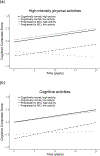Self-reported Lifestyle Activities in Relation to Longitudinal Cognitive Trajectories
- PMID: 30376509
- PMCID: PMC6389389
- DOI: 10.1097/WAD.0000000000000281
Self-reported Lifestyle Activities in Relation to Longitudinal Cognitive Trajectories
Abstract
Background: Few studies have examined the relationship between lifestyle activity engagement and cognitive trajectories among individuals who were cognitively normal at baseline.
Objective: To examine the relationship of current engagement in lifestyle activities to previous cognitive performance among individuals who were cognitively normal at baseline, and whether this relationship differed for individuals who subsequently developed mild cognitive impairment (MCI), or by APOE-4 genotype, age, and level of cognitive reserve.
Methods: Participants (N=189) were primarily middle-aged (M=56.6 y) at baseline and have been prospectively followed with annual assessments (M follow-up=14.3 y). Engagement in physical, cognitive, and social activities was measured by the CHAMPS activity questionnaire. Longitudinal cognitive performance was measured by a global composite score.
Results: Among individuals who progressed to MCI (n=27), higher lifestyle activity engagement was associated with less decline in prior cognitive performance. In contrast, among individuals who remained cognitively normal, lifestyle activity engagement was not associated with prior cognitive trajectories. These effects were largely independent of APOE-4 genotype, age, and cognitive reserve.
Conclusions: Greater engagement in lifestyle activities may modify the rate of cognitive decline among those who develop symptoms of MCI, but these findings need to be confirmed in prospective studies.
Conflict of interest statement
Figures



Similar articles
-
Association Between Mentally Stimulating Activities in Late Life and the Outcome of Incident Mild Cognitive Impairment, With an Analysis of the APOE ε4 Genotype.JAMA Neurol. 2017 Mar 1;74(3):332-338. doi: 10.1001/jamaneurol.2016.3822. JAMA Neurol. 2017. PMID: 28135351 Free PMC article.
-
Lack of reliable evidence for a distinctive ε4-related cognitive phenotype that is independent from clinical diagnostic status: findings from the Australian Imaging, Biomarkers and Lifestyle Study.Brain. 2013 Jul;136(Pt 7):2201-16. doi: 10.1093/brain/awt127. Epub 2013 Jun 3. Brain. 2013. PMID: 23737466
-
Informant-Reported Cognitive Decline and Activity Engagement across Four Years in a Community Sample.Gerontology. 2017;63(5):469-478. doi: 10.1159/000475594. Epub 2017 Jun 9. Gerontology. 2017. PMID: 28595181
-
Integrating Lifestyle Factor Science into Neuropsychological Practice: A National Academy of Neuropsychology Education Paper.Arch Clin Neuropsychol. 2024 Feb 19;39(2):121-139. doi: 10.1093/arclin/acad078. Arch Clin Neuropsychol. 2024. PMID: 37873931 Review.
-
The PAPA Questionnaire: Assessment of Long-Term Engagement in Activities, with Separate Quantification of Their Physical, Cognitive, and Social Components.Clin Interv Aging. 2023 Mar 2;18:327-341. doi: 10.2147/CIA.S377917. eCollection 2023. Clin Interv Aging. 2023. PMID: 36891133 Free PMC article. Review.
Cited by
-
Potential Benefits of Physical Activity in MCI and Dementia.Behav Neurol. 2020 Feb 12;2020:7807856. doi: 10.1155/2020/7807856. eCollection 2020. Behav Neurol. 2020. PMID: 32104516 Free PMC article. Review.
-
The effect of cognitive reserve on the risk of cognitive frailty in older patients receiving maintenance hemodialysis: a cross-sectional study.Eur Geriatr Med. 2025 Jun 23. doi: 10.1007/s41999-025-01260-6. Online ahead of print. Eur Geriatr Med. 2025. PMID: 40550994
-
Does Experience Enhance Cognitive Flexibility? An Overview of the Evidence Provided by the Environmental Enrichment Studies.Front Behav Neurosci. 2019 Jul 9;13:150. doi: 10.3389/fnbeh.2019.00150. eCollection 2019. Front Behav Neurosci. 2019. PMID: 31338030 Free PMC article.
-
Change Is Good for the Brain: Activity Diversity and Cognitive Functioning Across Adulthood.J Gerontol B Psychol Sci Soc Sci. 2021 Jun 14;76(6):1036-1048. doi: 10.1093/geronb/gbaa020. J Gerontol B Psychol Sci Soc Sci. 2021. PMID: 32025733 Free PMC article.
-
The impact of lifestyle factors on trajectories of cognitive subtypes in the older adult population.Sci Rep. 2025 Aug 28;15(1):31744. doi: 10.1038/s41598-025-91171-0. Sci Rep. 2025. PMID: 40877588 Free PMC article.
References
-
- Livingston G, Sommerlad A, Orgeta V, et al. Dementia prevention, intervention, and care. Lancet. 2017;390(10113):2673–2734. - PubMed
-
- In: Downey A, Stroud C, Landis S, Leshner AI, eds. Preventing Cognitive Decline and Dementia: A Way Forward. Washington (DC)2017. - PubMed
-
- Medicine Io. Cognitive Aging: Progress in Understanding and Opportunities for Action. Washington, DC: The National Academies Press; 2015. - PubMed
-
- Laurin D, Verreault R, Lindsay J, MacPherson K, Rockwood K. Physical activity and risk of cognitive impairment and dementia in elderly persons. Arch Neurol. 2001;58(3):498–504. - PubMed
Publication types
MeSH terms
Substances
Grants and funding
LinkOut - more resources
Full Text Sources
Medical
Miscellaneous

